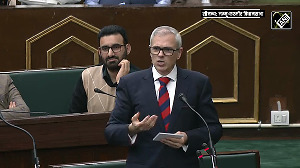India urgently faces a shortage of around 200,000 IT and ITeS professionals. The shortage is bound to grow to 3.6 million in the next eight years.
According to a Nasscom-Mckinsey study, India needs at least 630,000 IT professionals in 2004, but it still lacks 175,000 in manpower. By 2006, there will be another 430,000 fresh demand to be met.
It will increase to another 990,000 in 2009 and by 2012 it will reach 3.6 million. And if Morgan Stanley estimates are to be believed, Indian offshoring industry is expected to increase by more than triple to 24 per cent from eight per cent currently.
Expressing concern over the dearth of getting qualified professionals according to the need of industry, those in the industry say as there exists a shortage in the supply of manpower, India has to urgently address the situation by focussing more attention on the education system.
The IT training institutes are tuning themselves to the emerging scenario in BPO industry, which is supposed to grow by at least 54 per cent, by introducing new programmes co-designed with the industry to meet their demands.
While NIIT and the IT wing of Zee Group have announced new programmes in ITeS-BPO training, the state governments of Andhra Pradesh, Karnataka and Kerala are devising new plans to train youth in the BPO sector.
There is a shortage of qualified professionals. It's true. As an IT raining institute we are working with industry to solve the problem, Dr Smarajit Dey, president of NIIT says.
The training scenario is dramatically changing these days as the industry is more involved in developing the curriculum. They are interacting with the institutes on their needs. After identifying their manpower needs, now the industry informs the institutes they are aligned with about their specified needs and train people accordingly.
As the trend is emerging, the institutes are redefining their relationship with industries. Earlier, if the industry's participation in training sector was dismally low, the situation is changing fast. Leading employers are now excited that they have an opportunity to customise a part of the curriculum, as well as participate in the selection of the students.
Says Dey, "The industry is more active now a days than earlier. They are specifying us about their needs and requirements. So we can supply them well trained people."
"This kind of co-operation with the trainers and industry combines the generic IT skills with company-specific skills to create a pool of professionals who are both industry-ready and are productive immediately," Dey elaborates.
Economically, for the company, this means cost effectiveness. Companies from now onwards don't need to worry about training a fresher to suit the company.
But if India is going to lag behind in creating professionals, industry sources feel that the country will suffer as it is a dependable source of forex.
Even the slump of 2001 didn't affect the Indian industry here as contemplated. Though the slowdown created apprehension in industry and training sector, it soon recovered its lost pace and displayed its inherent strength, they say.
But if India is complacent in training fresh professionals, India's contenders will grab the opportunity, Dey ponts out.
India stands a good chance in the industry as Indians have the required skill for the industry like conceptual, software and communication skills, he adds.
But former Telecom Commission chairman N Vittal, who had played an instrumental part in developing Indian IT industry, cautions the laxity in an article, The Horse that Flew that "the English advantage we have may be eroded by 2008 when China has promised that at the time of Olympics practically all concerned, from the porter at the airport to the bell boy in hotel will speak English."
"If this advantage is lost how are we going to overcome the problem?" he asks.
He suggests that India should look to regional languages and widen the domestic market in India.
IT training has changed a lot. Earlier, it was single faced. As time changed and technology developed, training became multifaceted. It has become professionally oriented, points out Sanjiv Kataria, an ITeS training expert.
IT training, especially with the invention of BPO, has become more employment oriented assuring students a job, he adds.






 © 2025
© 2025